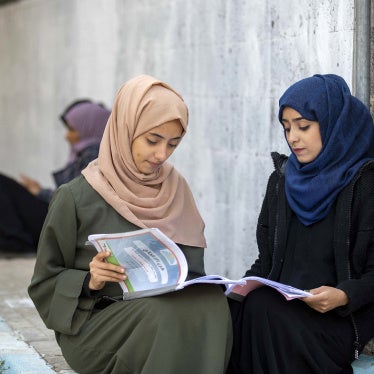On a warm Tripoli evening, in a room overlooking the Mediterranean, a few hundred Libyan women gathered this month for the first women’s rights conference since the fall of Muammar Gaddafi. They argued about how to facilitate participation in a new government, about the role of Sharia law, and about how to abolish laws discriminating against women in marriage.
At first it seemed as if the conference would remain a quiet affair, but one evening the meeting took a dramatic turn: At around 5 p.m., with very little fanfare, chairman of the governing National Transitional Council, Mustafa Abdeljalil, strolled into the conference hall, accompanied by other NTC members, members of the Tripoli Council, and the Minister of Capacity Building, Farage Sayeh. There was a moment of complete silence. Then women began to applaud as Abdeljalil took the stage. This time, unlike his infamous speech on the day of the Declaration of Liberation—in which he failed to acknowledge the role of women in the revolution and stated that Libya would re-introduce polygamy—Abdeljalil took care to enumerate the many ways that women had supported and led the revolution.
Abdeljalil asserted that Libyan women can expect to have the same rights as men and to play an important role in government, stating, “We expect women to be important figures in the future of this country.”
Then women, old and young, from Tripoli, Benghazi and the western mountains, some with headscarves, some dressed in jeans and sneakers, jostled for position at the microphone to pepper Abdeljalil with questions. For almost an hour, they took the leader of their newly liberated country to task for his comments on polygamy, asked him whether he would include a quota for women in the new constitution and reminded him, repeatedly, that women have a key role to play in the rebuilding of Libya. Abdeljalil listened quietly and patiently, took notes, and answered many of the questions. He explained that he did not particularly support polygamy, and that he wanted to hear women’s views before any decisions were made.
As he answered questions, a commotion broke out in the back of the hall. The new prime minister, Abdulrahmin el-Keeb, had arrived. He was followed into the hall, in rapid succession, by the minister of justice, the security minister and the information minister, all of whom talked about the vital role women played in the revolution and affirmed the role that they must now play. The Minister of Justice, Mohammed AIlagi, went so far as to say that he would support a quota for women in government and that at least one of the top three positions in government should go to a woman. By now, the entire National Transitional Council was sitting at a hastily placed table in the front of the room. Then former prime minster Mahmoud Jibril arrived.
Singing and chanting broke out as women cheered the significance of what was taking place in an ordinary conference room on this November evening. Libyan women crowded around the table to listen as Jibril affirmed his personal commitment to women’s rights, posing for photographs on mobile phones, and listening as the women called family and friends to share what was taking place.
The following morning, the conference got back to business. Some of the excitement had worn off, and participants now spoke about holding the politicians accountable for the lofty promises they had just made.
At the end of the conference, the women presented a list of recommendations for the National Transitional Council leaders, enumerating key challenges that Libya faces today. They urged leaders to enact new laws to protect women from violence, and guarantee access to justice, health care and psychological support. They asked the NTC to promote women’s equality and back their ability to participate in public life. And they reminded the government about the necessity of investing in women’s economic empowerment. Finally, the participants asked Libya’s new leaders to sign major international human-rights agreements.
What started out as a modest attempt to bring women together had turned into a moment when a new Libya was briefly visible, where rights for all could be protected and respected. Libya’s women had laid out their vision for a fresh beginning, and their leaders had come to listen. Now they must press those leaders to make their words a reality.
Liesl Gerntholtz is the director of Human Rights Watch’s women’s rights division








